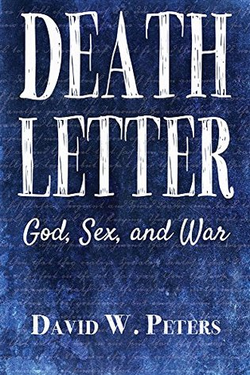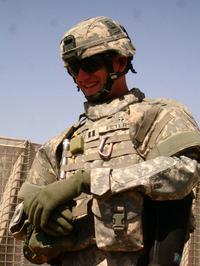In his memoir "Death Letter: God, Sex, and War," David W. Peters writes with black humor and grace about his deployment to Iraq as an Army chaplain, and the dark days following his return to the U.S.
Faced with tragic memories of his time in Iraq, his wife's infidelity, and his subsequent divorce, in "Death Letter" Peters grapples with his faith in God, even as he suffers the joys and indignities of coming-of-age sexually while in his mid-30s. "Death Letter" is by turns tragic and hilarious, and Peters' writing is reminiscent of the painful beauty and nostalgia of Tim O'Brien's "The Things They Carried."
I spoke with David W. Peters about "Death Letter."
Mary Pauline Lowry (MPL): You call your memoir "Death Letter: God, Sex, and War" and in the beginning of the book you explain that every solider who goes to war writes one--a letter to be sent to his family in the event of his death. In the first chapter, you say that the book is a death letter to all those who lost something in war. Can you explain what you mean by that?
David W. Peters (DWP): I went to war knowing I might lose my life. Just a few days before I officially took the oath to join, a dentist was killed in Baghdad. I knew that if a dentist could get blown up a chaplain could, too. What I didn't know was that I could lose more than my life. Most people lose something in a war. It can be their innocence, their sense of safety, or just the belief that the world is a good place. For me, that something that I lost was a someone. At first I thought it was my wife or my kids, but while I was living the experiences in this book, I realized it was God. I didn't think that would happen when I got on the transport jet to Iraq.
MPL: Other military memoirs (such as Anthony Swofford's "Jarhead") address the idea that one of a soldier's greatest fears is that his or her spouse will be unfaithful during the soldier's deployment. In "Death Letter" you write with great feeling, despair, and humor about dealing with the aftermath of both your deployment, and your wife's infidelity during that time. Why did you decide to write about this overlap of the trauma of war and the upheaval that awaited you when you returned?
DWP: In my training for war, both as an enlisted Marine Corps and Army chaplain, we used the "Jody Call." The Jody Call is a running or marching chant about this guy, "Jody," who's sleeping with your woman while you're away. It comes as no surprise that this is an excellent way to inspire young men in their 20s to kill and maim the enemy. Singing about Jody is kind of funny until it happens to you. I think I was shocked by the fact that I was just like most of the Soldiers I served with, many of whom had the same thing happen to them. Here I was, the marriage guru, finding out that my wife had a boyfriend! That's good comedy--dark comedy--and it comes out in the book.
While I was working as a chaplain at Walter Reed [National Military Medical Center], most people, patients and staff, were surprised that I was a divorced chaplain. At first I was ashamed of being in this "club" but then I realized that it opened doors to be with people in their pain and loss. I found that the more honest I was about my experience in war and in homecoming, the more Soldiers and veterans were able to push through some of the shame of their own experiences and move toward healing.
MPL: A Fundamentalist Christian upbringing, followed by a marriage in your 20s left you inexperienced when it came to dating and sex. In "Death Letter" you write extremely candidly of your sexual-coming-of-age when you were a divorced Army chaplain in your 30s. Can you talk a little bit about the experience of being both a chaplain and a single man trying to find your way romantically? And do chaplains privately talk about their personal romantic struggles amongst themselves?
DWP: Yes, this book is about sex--my sex life, in particular. I wrote about my relationships with women for a couple reasons. The first reason was that I was trying to make sense of it myself. After a string of failed relationships of all kinds, I tried to understand that part of me that needed this experience. Jonathan Shay writes in his classic, "Odysseus in America: Combat Trauma and the Trials of Homecoming," about how combat veterans often seek comfort in women, only to feel trapped by women. He cites how Odysseus meets the beautiful Circe on her island and then has to escape her trap, just like he escaped the enemy in the war. I knew, deep down, I was angry at women, but I couldn't stay away either. I also heard many stories from chaplains about their chaotic romantic lives. I also listened to so many caregivers, doctors, and nurses share their crazy stories. I read a number of books written by chaplains about war and homecoming and they always left these parts out. I don't fault them for doing this, but I needed to know I wasn't alone. I guess I wrote the book that I needed to read. The thing that surprises me about the feedback I get from "Death Letter" is how many people tell me stories that parallel mine. They often say thanks for helping them know they weren't alone.
MPL: "Death Letter" examines your experiences with God, sex, and war, and the way these three things intersect in your work as a military chaplain. What made you to decide to tackle three such heavy hitting topics?
DWP: While it appears that wars are fought on the ground, on the sea, or in the sky with jets and missiles, they are primarily fought on a mythic level of reality. What I mean is that when we fight in a war, we become gods. We have the power of life and death in our hands and we are swept up into something much bigger than ourselves. It's what the late James Hillman wrote about in his final and greatest book, "A Terrible Love of War." There are wars all over the world because we love it so much. I have to confess my own love of war. I miss being in Iraq, mainly because it was so simple and straightforward over there. Life back here, back home, is complicated. Dying is easy, coming home is difficult. I wanted to capture some of that in "Death Letter."
Sex is like war in that it takes us to the same mythic place, outside our own reality. Then, after it's over, reality comes crashing back in. I show in my book how these three subjects are related for me. I had to stare these three subjects square in the face after I came home from war, and I came away from that experience a changed person.
God, like the two other subjects, just doesn't seem to go away for me. God seems to show up in the most unexpected places, like war and sex. My experience of war and sex gave me a different perspective on God and God's involvement in "the affairs of men"--so to speak. Paul Tillich said that, "The courage to be is found in the God that appears when God disappears in the anxiety of doubt and fear." Tillich was an army chaplain in WWI, on the German side. I found in his writing and life some hope for me. I include an appendix in the book called "Paul Tillich and I Come Home From War." I found what I call "biographic kinship" with Chaplain Tillich that helped me come back to a belief in God when God seemed to have disappeared in Iraq. I think that the power of memoirs and biographies lies in their ability to find points of contact with other people's lives that help us place our story in the larger story of the world. I hope "Death Letter" can offer biographic kinship to my brothers and sisters, especially the chaplains, medics, nurses, doctors, and other caregivers who made it home alive, but changed.

David W. Peters
MPL: In the book, you explore your Fundamentalist Protestant upbringing and the way your own experiences led you to break with that particular faith. How does this evolution of your faith come into play in your current work as an Episcopal priest?
DWP: Religion and faith are powerful things, even though they are based on belief in things and people that are largely invisible and scientifically un-provable. I know, first hand, how powerful these forces have been in my life and in the lives of so many. Part of my task as a young man was to make the faith that had been given to me by my parents and my church my own. One of the good things about fundamentalism is that they teach people to ask questions of the establishment. That is, after all, how fundamentalism usually gets started. I'm a third generation clergyperson on my father's side and each of these pastors left some of their heritage to become Baptist, or non-denominational Protestant. By joining The Episcopal Church and becoming a priest in that church, I may be following in their footsteps more than I even know.
The wonderful thing about American religion is that people have many choices. I made a choice to go with the particular church that helped me spiritually when I was in the biggest transition of my life. My experience of leaving the church of my youth was difficult, but not uncommon today. I think this gives me a better understanding of all the strange places people come from when they walk into the doors of my church on a Sunday morning.
Some of my work in the church now is with veterans, a group of people who have been changed by war. I'm constantly amazed by how so many of them tell me that they felt like they weren't welcome in church when they came home from their war (Korea, Vietnam, Iraq, and Afghanistan). Some of them walked out and others just left the veteran part of their identity at the door of the church. I want them to start bringing those parts of themselves into the church. We've been doing this recently in Austin, TX with our Pilgrimages of Remembrance and Reconciliation. In short, we are bringing our war experiences right into the church, right down the center aisle, and placing these experiences right on the altar. Just like we lift the bread and the wine up at communion, we lift these experiences up to God and pray that God will change these experiences into means of blessing and grace for people around us. We veterans have amazing gifts to give our nation and world, if only we can get through the grief, anger, and isolation caused by our wartime experiences. It's exciting work and I'm thankful to get a chance to help my sisters and brothers.
My work as a priest is to reconcile people to God, to others, and to their own self. Sadly, many veterans withdraw from relationships and are very alone. I write in the book that I could never promise my Soldiers they wouldn't die. I would always say to them before we left the wire, "You know, the founder of my religion died 500 miles west of here." They would usually laugh. Then I'd say, "What I do promise you is that I'll be with you no matter what happens--you won't be alone." So far, this is what I'm hearing about the book--that people feel that they're not alone in their struggles with God, sex, and war.

